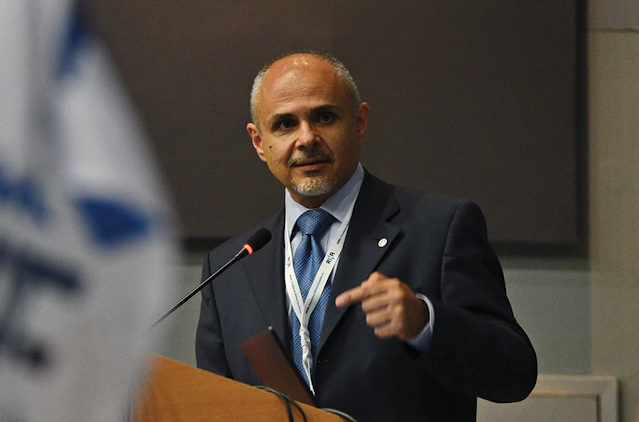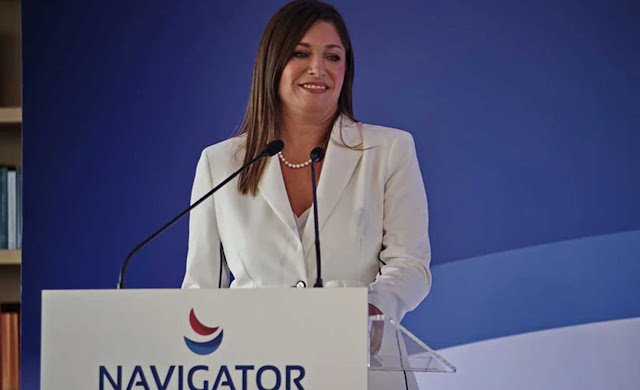Emanuele Grimaldi: Maritime is going to be a key enabler of the green energy transition for the entire world
| Emanuele Grimaldi, Chairman, International Chamber of Shipping |
The entire world has become increasingly aware of the importance of the shipping industry, and the past few years in particular have put shipping on the map of governments around the world.
Shipping continues to prove we are a resilient industry, one that is tackling challenges head on, shaping change rather than letting change shape us. It is this outlook that will help us deal with the challenges ahead and make the most of the opportunities they offer rather than seeing them as a barrier.
We are looking at the bigger picture, taking a holistic approach and addressing all of our challenges simultaneously. We know that we need to act faster, so that is exactly what we are doing.
When considering the future of the shipping industry, decarbonisation is one of the biggest challenges ahead.
This challenge does not stop at how we decarbonise our own ships. It includes evolving the training that our seafarers are going to need, having new green fuels available at the speed and scale required, and having the capacity to transport the new green fuels of the future for governments and sectors around the world to use.
In July at the International Maritime Organization (IMO), governments agreed on an ambitious new course and the speed that we should all travel to reach the destination.
This latest development can be seen more as a Memorandum of Understanding between member states to achieve ambitious climate targets by 2030, 2040 and 2050. Setting the course is only the start of the journey, now we need the measures in place to achieve our ambitions.
A global economic measure such as the International Chamber of Shipping’s (ICS) ‘fund and reward’ proposal that is aligned with a global fuel standard is key to meeting these ambitious targets. The availability of fuels must be realised – they do not exist at the scale required and those that are available are too expensive.
ICS’s ‘fund and reward’ proposal sets out a mechanism that will incentivise shipowners to use these new more expensive alternative fuels by narrowing the price gap between them and conventional fuels.
A global scheme is preferable to unilateral, regional applications of greenhouse gas pricing measures which will ultimately fail to reduce global emissions to the extent required. It is really promising that Greece’s shipping community supports ICS’s proposal and recognises that only via a global solution can you deliver the scale of transition needed.
Looking beyond decarbonising our own industry, maritime is going to be a key enabler of the green energy transition for the entire world; at least 50% of net zero fuels are expected to be moved by ships (according to IRENA). We know how difficult pipelines are to build and the reality is that our industry provides the flexibility the world needs to transition at speed and at scale.
If we work with the other industrial sectors our industry has an opportunity to create a new value chain which will also de-risk our own transition. We urgently need to link all the elements of the energy value chain so we can build the capacity to transport these new fuels from producers to consumers. By thinking about our own needs only, we risk missing the big picture. This is why an initiative such as the Clean Energy Marine Hubs (CEM Hubs) is so important. The initiative is a unique partnership between the International Association of Ports and Harbors, the Clean Energy Ministerial, and the International Chamber of Shipping underneath the umbrella of the Clean Energy Ministerial, which is made up of energy ministers from around the world, and of which Greece is a key participant.
The aim of the CEM Hubs is to accelerate the deployment of infrastructure, and to de-risk the investment needed to ensure that the whole world can have access to low-carbon fuels close to the ports for the maritime sector to transport and use. Shipping must also have access to these new fuels, as without shipping the world cannot decarbonise.
I must also emphasise here a threat looming on the horizon that could jeopardise the world’s ability to decarbonise; protectionism. Decades of progress towards open markets has begun to reverse in recent years, with damaging restrictions imposed as weapons in trade wars or in response to the pandemic.
Countries at all levels of economic development would be better off if even modest reductions were made to the existing barriers. The International Chamber of Shipping quantified our findings into a comprehensive research study: The ICS Protectionism in Maritime Economies Study. This Study is a tool designed to help maritime nations identify the restrictive measures preventing national economies from reaping the full benefits of a more efficient maritime transport service. The Study demonstrates clearly that a lower level of trade-restrictive measures affecting maritime transport could increase some economies’ GDP by up to 3.4% – this is very significant. For shipping to play its full role in the decarbonisation journey, ships must be able to travel between ports without facing unnecessary restrictions to deliver this important cargo.
Decarbonisation will create challenges for our workforce, but this is where there are also opportunities. Together we can create a skilled workforce in an industry that offers excellent career prospects.
This energy transition and transformation must be a safe one, with the welfare of our seafarers at the heart of our decision making. At COP26 we unveiled the Maritime Just Transition Task Force which has already been making great strides to shine the light on the training that our seafarers will need to capitalise on the opportunity decarbonisation offers.
The Task Force estimates that approximately 800,000 seafarers will need upskilling by the mid-2030s to handle the new green fuels of the future. When you consider that shipping is facing a shortage of approximately 90,000 officers, we have a considerable challenge on our hands.
This is where I see huge opportunities for Greece which can build on its already robust and respected workforce which is over 30,000 seafarers strong. Grimaldi Group has a workforce approximately 12,000 strong, so I am very aware of the scale of the challenges ahead to upskill our seafarers.
To capitalise on this transition, all parties – governments, employers, and trade unions – must collaborate, to align the various training, health and safety, and investment elements.
This need for closer collaboration was a lesson learnt at the recent Seafarer 2050 summit hosted in Manila in June. What also came through loud and clear was that we need to make policy makers understand the value of the seafarer workforce over other trades. This will require data gathering on an international scale.
The overarching message from the summit was that it is incumbent on all of us to work together, to ensure that shipping’s next steps in response to the climate emergency puts seafarers at the heart of the solution.
We have just twenty-seven years to go until 2050. I know that this might sound like a long time, but I can guarantee that it will pass quickly. Changes take time, the energy transition is not a switch that will happen over night but something that will happen over many years, but we need to keep our spirit of cooperation and momentum going at even greater speed to tackle our biggest challenge yet – decarbonisation. It is only by working together that we can create a decarbonised future for the entire world.




